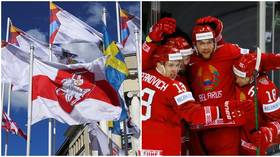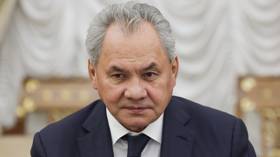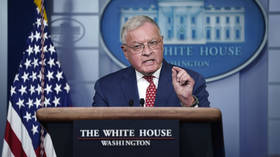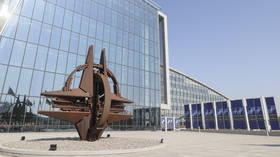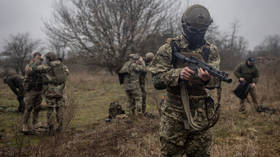Flag swap at Holocaust memorial causes outrage
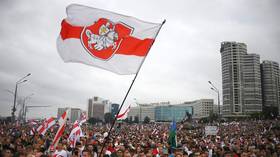
Belarus launched a criminal probe on Monday after its national flag was replaced by the one used by the country’s opposition at the former Buchenwald death camp in central Germany.
Minsk has insisted that “trampling upon the memory of all Belarusians, who lost their lives in World War II, and of tens of thousands of Belarusian prisoners of concentration camps” was unacceptable.
The flags were swapped ahead of a ceremony to mark 77 years since the liberation of the Buchenwald camp from the Nazis. It was held on Monday, but the delegations from Belarus and Russia weren't invited because of the conflict in Ukraine.
However, the images of the red and green Belarusian national flag being taken down and a red and white banner, which became famous internationally after a wave of anti-government protests in Belarus in 2020 and 2021, being flown instead of it have been uploaded on social media and did not go unnoticed in Minsk.
They’ve led to the German ambassador in Belarus, Manfred Huterer, being summoned to the foreign ministry on Monday.
On the anniversary of liberating the Buchenwald concentration camp, which housed many, including Soviet prisoners, they removed the flag of Belarus. The flag was replaced with the white-and-red WWII Nazi collaborationist flag from the area (also used by the opposition). 🤦🏻♀️ pic.twitter.com/RaV8WCFEwB
— Nina 🐙 Byzantina (@NinaByzantina) April 11, 2022
The envoy was told that considering the “the suffering of the Belarusian people at the hands of the fascist invaders” and the nation’s overall contribution to the victory over the Nazis, “such actions of the German side cannot be justified by any means, especially by any momentary or opportunistic reasons.”
The same day, the Belarusian Prosecutor General’s Office launched a criminal case for stirring up national hatred in relation to the incident at Buchenwald, which is now a museum and Holocaust memorial.
The agency echoed the foreign ministry labeling the flag swap a “cynical” act that “diminished the honor and dignity of the Belarusian people” and "a mockery of the memory of millions, who died on Belarusian territory” during World War II.
According to Belarusian law, the relevant article of the criminal code could carry a punishment of from three to ten years in prison. The investigators currently don’t have a suspect, with a statement saying that an “unidentified person” had tampered with the flags.
Buchenwald was one of the first concentration camps set up by the Nazis. It remained operational between 1937 and 1945, with more than 76,000 people estimated to have died within its walls.
Belarus troops aren’t taking part in the fighting in Ukraine, but Minsk has still faced international condemnation and sanctions for being Moscow’s ally and for allowing Russian forces passage through its territory.
The red and white flag that became the symbol of the Western-backed Belarusian protests has a rather controversial history. It was initially designed for the Belarusian Democratic Republic (BNR), a self-proclaimed state that only existed between 1918 and 1919. The same banner was later used by Belarusian nazi-collaborators during World War II.
Eventually led by Radoslav Ostrovsky, who later emigrated to the US, they supported the holocaust. Today, the flag is used by supporters of Western-backed activist Svetlana Tikhanovskaya.
